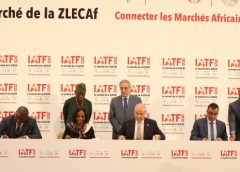In the context of global energy transition, Chinese electric vehicle (EV) manufacturers are intensifying their efforts to conquer the African market, seeing considerable growth potential. This expansion strategy is part of a desire to diversify their international markets and establish themselves as leaders in a region still largely untapped by the EV industry.
Several major Chinese players have recently made significant inroads on the African continent. Neta Auto, a brand developed by the startup Zhejiang Hozon New Energy Automobile Company, opened its first flagship store in Kenya last June. The company aims to open 100 stores in 20 African countries over the next 2 to 3 years, with a sales target exceeding 20,000 vehicles.
Xpeng Motors, another renowned Chinese manufacturer, introduced its G9 and P7 models to the Egyptian market in mid-June, marking its entry into the African and Middle Eastern markets after primarily focusing on Europe.
BYD, a Chinese EV giant, signed an agreement with Ampersand, an EV technology company based in Kigali, Rwanda. This partnership aims to strengthen BYD’s presence in Africa by increasing sales of new energy and plug-in hybrid vehicles. The agreement notably includes the supply of BYD batteries for the construction of about 40,000 electric motorcycles by the end of 2026, as part of a broader mission to electrify the majority of Africa’s 30 million commercial motorcycles.
This offensive by Chinese manufacturers in the African market is explained by several factors. First, Africa represents a largely untapped market with significant growth potential. With a rapidly growing population and increasing urbanization, the demand for vehicles is expected to rise sharply in the coming years.
Moreover, Chinese automakers benefit from competitive advantages such as cost-effective production and a complete supply chain, allowing them to offer vehicles at more competitive prices and thus more accessible to African consumers.
Supportive policies and investments from Chinese and African governments have also facilitated the entry of Chinese companies into the African market. Initiatives such as the Belt and Road Initiative have strengthened economic ties between China and Africa, creating favorable conditions for Chinese businesses.
Finally, many African countries are stepping up efforts to embrace the green transition of the transportation sector. For example, the Ethiopian government plans to import 4,800 electric buses and 148,000 EVs as part of its 10-year development plan for 2021-2030. Incentives such as duty-free importation of EV parts are being implemented to promote the use of EVs and knowledge transfer.
With a penetration rate of new energy vehicles below 1% in Africa and the Middle East according to the International Energy Agency, Chinese EV manufacturers see a significant opportunity to gain a head start over their competitors by expanding their product lines and enhancing their brand recognition in these regions.
This expansion of Chinese EV manufacturers in Africa could not only transform the continent’s automotive landscape but also significantly contribute to reducing carbon emissions and promoting more sustainable mobility in the region.






